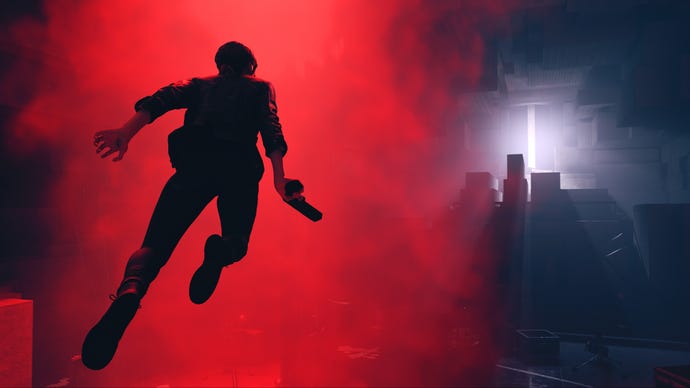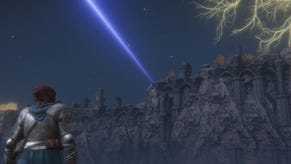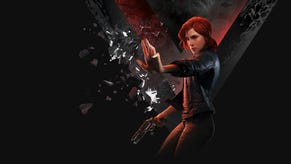The next game from the Max Payne dev will twist your mind more than quantum physics
Quantum Break had a singular goal: to blend video game storytelling with television. For Remedy’s next title, the developer wants to establish phenomena beyond human comprehension.
You play as Jesse, a woman who has witnessed the cracks in reality. She heads to the Bureau of Control, a secret government agency set up to parse the unknowable, drawn there by a sinister hum.
The Bureau has been taken over by an entity (perhaps entities, gas, radiation, or interdimensional energy) that twists the innards of the facility, as well corrupting the agents within. The Bureau calls this manipulative force the Hiss.
“There are elements in the world we don’t understand, and that’s what the Bureau is doing - they’re trying to understand,” game director Mikael “Mixu” Kasurinen tells me. “Sometimes they succeed, and sometimes they are baffled because it doesn’t seem to follow any logic or pattern. It was important to us that we created this unexpected, unsettling world. That’s the core premise.”
Control is shaped by a genre of fiction called New Weird and takes influence from novels such as Annihilation and House of Leaves. In the latter, a strange corridor appears inside a house, eventually spiralling down into a space so vast that it warps people’s minds.
“I’m a huge fan of [House of Leaves] and it’s definitely one inspiration,” Kasurinen tells me when I ask about the similarities between Control and Danielewski’s debut novel. “What was great about that book is that there are so many layers on top of it, and it’s people trying to understand strange phenomena and trying to come up with an explanation.”
In the book, the strangeness slowly creeps in as the characters attempt to understand irregularities via scientific methods - just like how the Bureau of Control wants to parse the otherworldly Hiss.
The game takes place in the Bureau’s command centre, known as The Oldest House - a bleak, brutalist skyscraper located in the heart of the city.
Jesse arrives at The Oldest House with fresh eyes, just like the player. On arrival, the Director of Control is killed and the facility goes into lockdown. Jesse picks up the Director’s weapon and takes up his mantle to fight through the facility.
If the premise sounds confusing, that’s intentional. Nothing is meant to make sense in this place, but you slowly learn to understand its twisted logic as you battle your way through.
“When we talk about storytelling, we want to create immersive experiences with believable characters, but it’s also about what kind of stories we want to tell,” Kasurinen explains. “All of our games start from an approachable setup - a character from our world and so on. When we were talking about The Oldest House, it wasn’t from a cold design perspective. It’s more about what it feels like, which is both exciting and unsettling. You see things you don’t necessarily understand, but you are compelled by it.”
I see glimpses of this in the demo. At one point, Jesse must use dream logic to bypass a dead end. In front of her stands a blank wall, a lightswitch dangling next to it. After flicking the lightswitch on and off a few times, a door appears where there wasn’t one before. It reminds me of how experiments in quantum physics behave differently when under observation.
“You want to learn how it all works, but it’s also important to us that there are layers to it,” the game director says. “You see something, think it’s one thing, but once you start scratching at the surface, you see more, you investigate, and it might be something you didn’t expect. It gives a different perspective. We want this place to be complex and things aren’t always as they seem.”
A side mission in the demonstration sees an agent trapped in an experimentation chamber with a refrigerator. He says he can’t take his eyes off it because it might “deviate” - I guess observation really does change the outcome in Control’s world. Either way, you can choose to insert yourself into these self-contained stories, or you can carry on pursuing the main questline. It’s completely up to you if you want to observe the outcome or not. I just hope you can live with yourself if that guy is eaten by the fridge.
“We always want to have some incentive,” Kasurinen says of side missions. “With the fridge, for instance, you learn something more about the world. Also, from an emotional perspective - I don’t want to reveal too much - how dangerous this place is, how unexpected it can be.”
The story and world are clearly the main pull here, and I can’t think of another triple-A game that does unsettling, hair-raising weirdness quite like this. It’s not always overtly creepy like a horror game - everything just seems off, like something lurking in the periphery.
Of course, this being a game from a developer known for kinetic and dynamic gunfights, Control will also aim to deliver there. You have a range of supernatural powers and will be free to fling any part of the environment at your foes, or grab debris from your surroundings to create a shield. At one point, Jesse gestures her hand and catapults a forklift at a corrupted Bureau agent.
Jesse also has a shapeshifting sidearm called the Service Weapon, which transforms into different weapon types, all of them capable of tearing through the fully destructible scenery.
“In our past games, the player always went through this world and collected an arsenal that they brought with them and it didn’t fit into the world, it didn’t feel right,” Kasurinen explains. “That’s when we started thinking about this iconic weapon, like the lightsaber for a Jedi. The Service Weapon is the supernatural weapon of the Director - the inspiration is the story of the Sword in the Stone, where whoever pulls the sword from the stone becomes the king.
“It has a symbolic meaning to it. It is able to shift into different forms. Nobody knows exactly how old the weapon is. Imagine going back in time 2000 years and it would look very different at that time. It starts out as one thing, then we find different resources and elements that allow you to unlock more different types of forms - some of which are surprising and interesting. We wanted to elevate this weapon to something special and interesting.”
Out of all the games I saw at gamescom, Control’s mind-fuckery is what stayed with me the most: combat looks fresh, dynamic, and exciting; the story and its mysteries draw you in, just like The Oldest House pulls Jesse to its door; and everything seems in place for it to be the most interesting shooter Remedy has ever made. I just hope it doesn’t deviate.












